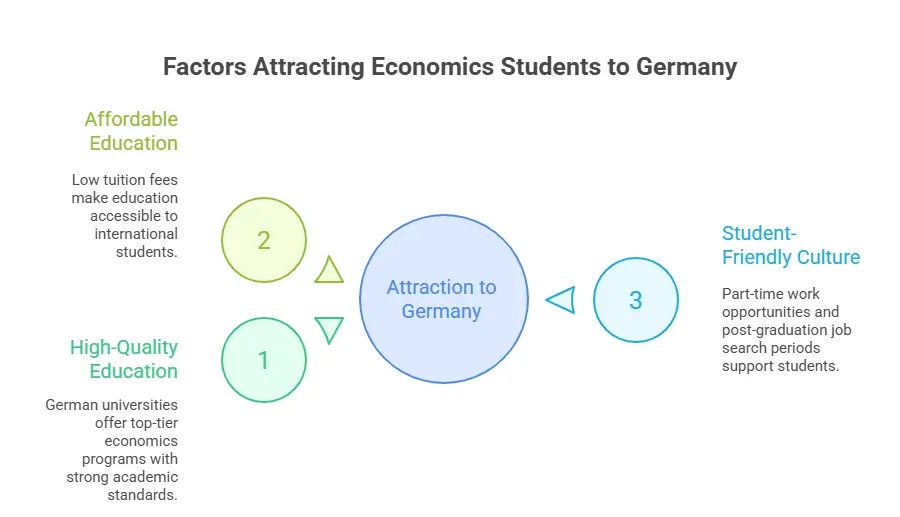Table of Contents
If you plan to build a strong career in economics, Germany is one of the best places to study. A master’s degree in economics in Germany gives you access to globally recognized universities, practical learning and research opportunities – all at an affordable price. With growing demand for economists skilled in finance, data analysis, policy and international development, studying in Germany can open the door to extraordinary global career paths. This blog will guide you about the courses, admissions and career opportunities that await you.
Start learning German today to fast-track your career in Germany!
Why Study Economics in Germany?
Germany has become one of the maximum famous places for college students who want to take a look at Economics, and there are numerous motives behind this growing career. One of the maximum crucial benefits is the high first-class of training offered through German universities. Many of these institutions are ranked a number of the top inside the global and are recognised for their sturdy instructional standards, superior research facilities, and experienced faculties. Economics programs in Germany focus on building analytical wondering, sensible competencies, and a deep expertise of world monetary structures, making graduates especially aggressive within the job market.
Another important reason for choosing Germany is the affordable education system. Unlike many other study abroad programs, many public universities in Germany charges very low tution fees for worldwide college students. This makes it feasible to get a world-magnificence education with out demanding about heavy financial burdens. Although the cost of living is manageable, in particular with student discounts, affordable accomodations and some financial support programs.
Germany is also known for its student-friendly culture. Every students can work part-time while they studying, allowing them to get professional experience and support their living expenses. After graduation, every students get the opportunity to stay in the country for up to 18 months for finding a job, which will increase the chances of getting a successful profession in Europe.
Eligibility and Admission Requirements
1: How do you say "Good Morning" in German?
To get right into a Master’s in Economics in Germany, college students have to meet certain instructional, language, and document-related standards. These necessities assist universities making sure that applicants are organized for advanced economic studies and can achieve an worldwide learning environment.
1. Bachelor’s Degree Requirements
To study Master’s in Economics in Germany, you must complete your bachelor’s degree from a recognized university. Most of the master’s should posses a bachelor’s degree in Economics, Finance, Business Administration, Mathematics, Statistics, or any other associated fields. Your undergraduate coursework have to display a solid basis in economics, which includes topics like microeconomics, macroeconomics, econometrics, and quantitative techniques. Many universities additionally expect applicants to meet a minimal GPA requirement, even though an appropriate score varies.
2. Language Proficiency (English/ German)
Germany offers Economics programs in both English and German, so your language requirements will rely upon the program you select.
- For English-taught programs:
You must provide clear proof of English talent by standardized tests along with:
-
- IELTS: Usually in between the score of 6.0 – 7.0
- TOEFL iBT: Usually in between the score 80 – 95+
- PTE or Cambridge English (well-known through some universities). If your bachelor’s degree was taught totally in English, some universities may additionally waive the check requirements.
- For German-taught programs:
You should have a strong understanding of the German language, generally at the B2 or C1 level. Accepted exams include:
-
- TestDaF
- DSH
- Goethe-Zertifikat
3. Required Documents
When applying for a Master’s in Economics in Germany, you may need to prepare and submit numerous important documents. These assist universities assess your instructional background, abilities, and motivation:
- Academic Transcripts: Official transcripts that displaying grades and finished courses from bachelor’s degree.
- Letters of Recommendation (LORs): Usually one to two letters from professors or employers who can speak approximately your educational capabilities or your work ethic.
- Statement of Purpose (SOP): A clear, well-written essay explaining your motivation for analyzing Economics, your academic background, profession goals, and reasons for selecting Germany.
- CV/Resume: Highlighting your academic achievements, internships, work experience, and applicable abilities.
- Language Certificates: Proof of English or German talent based on the program’s language of practise.
- Passport Copy: A valid passport or ID for verification purposes.
Some universities may also ask for:
- GRE scores (mainly for competitive Economics programs)
- Research proposal if applying to a research-focused master’s
- Writing samples such as academic essays
Submitting complete and accurate documents increases your chances of admission and ensures a smooth application process.
|
German A2 Exercises – Download Free PDF |
||
Free German A1 Mock Tests – Powered by AI!
Test your skills on our interactive platform. Get instant feedback from our AI to help you communicate better and track your progress. Start your free German mock test now.
Test Your German A1 for FreePopular Universities Offering Master’s in Economics
Germany is home to numerous top-ranked universities that provide exceptional Master’s applications in Economics. These institutions are regarded for their sturdy academic popularity, research possibilities, and worldwide reputation.
1. LMU Munich (Ludwig Maximilian University of Munich)
LMU Munich is one in all Germany’s oldest and most prestigious universities. Its Master’s in Economics program makes a speciality of economic concept, econometrics, and applied studies. Students advantage from world-class faculty, get admission to analyze institutes, and strong connections to industries and policy corporations. LMU additionally gives an international environment with students from around the globe.
2. University of Mannheim
The University of Mannheim is widely known for its excellence in economics and commercial enterprise research. Its Master’s in Economics software is noticeably studies-oriented, offering superior education in microeconomics, macroeconomics, and statistical strategies. The college highlists analytical competencies and prepares college students for both instructional and industry careers. Mannheim’s close ties with studies establishments and companies provide awesome opportunities for internships and placements.
3. University of Frankfurt (Goethe University Frankfurt)
Goethe University Frankfurt’s Master’s in Economics program combines theoretical understanding with sensible applications. Located in one of Europe’s primary financial hubs, the college gives students with exposure to real-world economic and financial activities. Students also can enjoy the universities partnership with the European Central Bank, financial institutions, and research facilities. The software gives optionally available specializations, making it suitable for students with varied interests in economics. These universities no longer best offer notable educational training however additionally open doorways to sturdy career possibilities in research, finance, authorities, and international companies.
Course Structure and Specializations
A Master’s in Economics in Germany is designed to give students a strong expertise of how economies work, how financial systems function, and how statistics may be used to make complicated decisions. The application normally combines theoretical expertise with realistic abilities, making ready students for careers in studies, finance, policymaking, and international corporations.
Core Subjects
Throughout the program, college students observe numerous core subjects that build a strong foundation in economics. These topics consist of:
- Macroeconomics: Understanding how international countries manage increase growth, inflation, employment, and economic policies.
- Microeconomics: Learning how people, markets, and organizations make their own financial decisions.
- Econometrics: Using the detailed records and statistical tools to research the economic trends and test financial theories.
- Mathematics for Economists: Strengthening analytical and quantitative abilities required for superior financial observations.
- Research Methods: Learning a way to conduct educational and professional studies.
Specializations
Many universities allow individuals to select a specialization based on their interests and career growth.
- Finance: Focuses on the economic markets, investment evaluation, and risk control methods.
- International Economics: Which covers international exchange, worldwide finance, and the economic relationships among the nations.
- Development Economics: Studies how economies grow and expand gradually, mainly in low-income or based on the emerging international locations.
- Public Economics: Reviewing the government policies, taxation, and public spending.
- Data Analytics / Economic Policy: Combines economics with data science and policy-making technologies.
Duration of the Program
Most Master’s in Economics packages in Germany take 2 years to finish. This consists of coursework, seminars, elective modules, and finally master’s thesis. Some universities may provide internships or research tasks as a part of this system.
Costs and Scholarships
Studying for a Master’s in Economics in Germany is often more less costly compared to many other study-abroad destinations. Understanding the fees and availability of financial support system will let you plan your research better.
Tuition Fees (Public vs Private Universities)
Most public universities in Germany provide master’s programs with little to no training costs, even for worldwide college students. You can also only need to pay a small semester price, which usually ranges from €150 to €350 and regularly consists of public transport passes and scholar services.
However, private universities price training expenses which could varies from €8,000 to €20,000 iannually, relying on the program and the institution. Public universities remains the maximum cost-effective choices for most college students.
Living Expenses Estimate
Cost of living in Germany is generally low, however the expenses may varies depending on the city. On average, students spend around €900 to €1,200 per month on living expenses. This consists of:
- Accommodation: €350–€600
- Food: €150–€250
- Transportation: Often included in semester fee
- Health Insurance: €80–€120
- Miscellaneous expenses: €100–€150
Cities like Munich and Frankfurt are more luxurious, while Leipzig, Bonn, or smaller cities are more budget-friendly and affordable.
Available Scholarships and Funding Options
International college students can apply for numerous scholarships to support their research studies in Germany. Some popular options such as:
- DAAD Scholarships: One of the biggest investment groups, presenting financial support for master’s students.
- Deutschlandstipendium: Merit-based scholarships offered by the government and the private sponsors.
- University-specific scholarships: Many universities offer their own funding applications or scholarships.
- Erasmus+ Scholarships: For students applying by companion universities in Europe.
Start learning German today to fast-track your career in Germany!
Free German A1 Mock Tests – Powered by AI!
Test your skills on our interactive platform. Get instant feedback from our AI to help you communicate better and track your progress. Start your free German mock test now.
Test Your German A1 for FreeCareer Opportunities After Master’s in Economics
A Master’s in Economics from Germany opens doors to a huge range of profession paths throughout industries. The program equips students with strong analytical, quantitative, and problem-solving skills, making them valuable in each public and private sectors.
Job Roles
Graduates can explore several rewarding job roles, including:
- Economist: Analyzing the financial traits, evaluating guidelines, and providing insights for governments, studies institutes, or worldwide agencies.
- Financial Analyst: Working with banks, monetary establishments, or investment corporations to evaluate the marketplace tendencies and support investment selections.
- Policy Advisor: Assisting governments, NGOs, or assume tanks in growing financial and social regulations.
- Data Analyst: Using data modeling and statistical equipment to assist business increase and choice-making.
- Consultant: Offering financial advice to groups and agencies on economic strategies and economic situations.
Companies and Sectors Hiring Graduates
Economics graduates from Germany are in demand throughout various sectors, consisting of:
- Financial establishments: Banks, investment companies, insurance organizations
- Government and public sector: Ministries, significant banks, statistical places of work
- International groups: World Bank, IMF, OECD, United Nations
- Research establishments
- Private companies: Consulting corporations, tech groups, manufacturing companies
Opportunities for PhD and Research
Many college students keep their academic journey by pursuing a PhD in Economics. Germany is understood for its top notch studies centers, research-centered universities, and globally diagnosed doctoral applications. PhD graduates can work as university professors, researchers, coverage professionals, or economists in global institutions.
|
Goethe 2025 Exam Dates: Multiple Test Centers |
|
| Trivandrum Goethe Exam Dates | Kochi Goethe Exam Dates |
| Chennai Goethe Exam Dates | Coimbatore Goethe Exam Dates |
Tips for International Students
Moving to Germany in your Master’s in Economics can be an interesting, and being organized makes the transition smoother. Here are a few beneficial tips to guide you through student lifestyles in Germany.
Visa and Residence Permit Information
International college students (non-EU/EEA) need to apply for a student visa before they arriving in Germany. After reaching the country, you must apply for a residence permit on the local Foreigners’ Office (Ausländerbehörde). Ensure you have all required documents, together with proof of admission, economic resources, medical health insurance, and accommodation details. Planning in advance helps you avoid delays and ensures a smooth start to your studies.
Accommodation and Lifestyle Tips
Finding accommodation early is vital, specially in crowded cities like Munich or Frankfurt. Students can pick out among shared residences (Wohngemeinschaft), student dorms, or private rentals. Living expenses also varies, however expenses for food, travel, medical health insurance, and leisure activities will help you manage cost. Germany gives a safe and student-friendly way of life with excellent public transports, cultural occasions, and beautiful places to explore.
Networking and Internships
Building a strong network is essential to developing your profession in Germany. Attend university occasions, seminars, workshops, and career festivals to connect with professors, specialists, and fellow university students. Many universities also have profession facilities that help students locate internships. Internships not only provide realistic experience however additionally enhance your chances of securing a full-time work after graduation.
Start learning German today to fast-track your career in Germany!
Conclusion
Pursuing a Master’s in Economics in Germany is a good choice for students who need a high-quality education, strong career opportunities, and enhancing international experience. With world-class universities, inexpensive study options, and programs that mix concept with practical talents, Germany prepares you for achievement in fields like finance, studies, policy, and worldwide development. From choosing the right university to exploring work possibilities, this guide offers you a whole evaluation that will help you to plan your academic journey. If you’re trying to build a stable and rewarding profession in economics, Germany offers the ideal atmosphere to develop, learn, and achieve your desires.
Free German A1 Mock Tests – Powered by AI!
Test your skills on our interactive platform. Get instant feedback from our AI to help you communicate better and track your progress. Start your free German mock test now.
Test Your German A1 for FreeFrequently Asked Questions
Is Germany a good place to study a Master’s in Economics?
Yes, Germany is an excellent choice for studying Economics. The country is home to top-ranked universities, strong research institutions, and affordable or zero tuition fees. Students also gain access to international faculty, practical learning opportunities, and a strong job market.
What are the admission requirements for a Master’s in Economics in Germany?
Generally, students need a bachelor’s degree in Economics or a related field, proof of language proficiency (English or German), academic transcripts, a CV, an SOP, and letters of recommendation. Some universities may also require GRE scores or specific coursework in economics and mathematics.
Are Economics master’s programs in Germany taught in English?
Yes, many universities offer Economics master’s programs entirely in English, especially those focused on international students. However, some programs are taught in German, so checking language requirements for each university is important.
How much does it cost to study Economics in Germany?
Public universities usually charge no tuition fees, except for a small semester fee (€150–€350). Private universities may charge €8,000–€20,000 per year. Students should also plan for monthly living costs of around €900–€1,200, depending on the city.
What career opportunities are available after completing a Master’s in Economics in Germany?
Graduates can work as economists, data analysts, financial analysts, consultants, policy advisors, or researchers. Germany’s strong economy and global companies offer excellent job prospects in banking, government, consulting, tech, and international organizations.
Can international students work while studying in Germany?
Yes, international students can work part-time for up to 120 full days or 240 half days per year. This allows students to gain experience, earn income, and improve their career prospects.
Is it possible to stay in Germany after graduation?
Definitely. Germany offers an 18-month post-study work visa, allowing graduates to stay and search for a job related to their field. Once employed, students may also qualify for long-term residency options.
Do universities in Germany offer scholarships to international students?
Yes, international students can apply for scholarships such as DAAD, Deutschlandstipendium, and university-specific funding. These scholarships help cover living costs, research expenses, and sometimes tuition fees at private universities.













